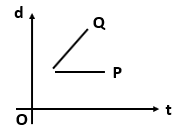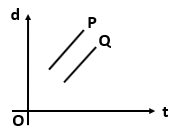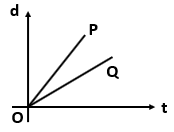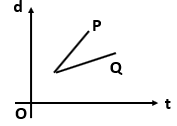A body is thrown upwards and reaches its maximum height. At that position:
1.
its velocity is zero and its acceleration is also zero.
2.
its velocity is zero but its acceleration is maximum.
3.
its acceleration is minimum.
4.
its velocity is zero and its acceleration is the acceleration due to gravity.
Among the four graphs shown in the figure, there is only one graph for which average velocity over the time interval \((0,T)\) can vanish for a suitably chosen \(T\). Select the graph.
| 1. |  |
2. |  |
| 3. |  |
4. |  |
A lift is coming from the \(8\)th floor and is just about to reach the \(4\)th floor. Taking the ground floor as the origin and positive direction upwards for all quantities, which one of the following is correct:
| 1. | \(x>0, v<0, a>0\) |
| 2. | \(x>0, v<0, a<0\) |
| 3. | \(x<0, v<0, a<0\) |
| 4. | \(x>0, v>0, a<0\) |
If in one-dimensional motion, instantaneous speed \(v\) satisfies \(0\leq v<v_0,\) then:
| 1. | the displacement in time \(T\) must always take non-negative values. |
| 2. | the displacement \(x\) in time \(T\) satisfies \(-{v_0T} \lt x \lt {v_0T}.\) |
| 3. | the acceleration is always a non-negative number. |
| 4. | the motion has no turning points. |
A vehicle travels half the distance \(L\) with speed \(v_1\) and the other half with speed \(v_2,\) then its average speed is:
| 1. | \(\dfrac{v_{1} + v_{2}}{2}\) | 2. | \(\dfrac{2 v_{1} + v_{2}}{v_{1} + v_{2}}\) |
| 3. | \(\dfrac{2 v_{1} v_{2}}{v_{1} + v_{2}}\) | 4. | \(\dfrac{L \left(\right. v_{1} + v_{2} \left.\right)}{v_{1} v_{2}}\) |
The variation of quantity \(A\) with quantity \(B\) is plotted in the given figure which describes the motion of a particle in a straight line.
Consider the following statements:
| (a) | Quantity \(B\) may represent time. |
| (b) | Quantity \(A\) is velocity if motion is uniform. |
| (c) | Quantity \(A\) is displacement if motion is uniform. |
| (d) | Quantity \(A\) is velocity if motion is uniformly accelerated. |
Select the correct option:
1. (a), (b), (c)
2. (b), (c), (d)
3. (a), (c), (d)
4. (a), (c)
Which one of the following displacement-time graph represents two moving objects \(P\) and \(Q\) with zero relative velocity?
| 1. |  |
2. |  |
| 3. |  |
4. |  |
A balloon starts from the ground from rest with an upward acceleration of \(2\) m/s2. After \(1\) sec, a stone is dropped from it. The time taken by the stone to strike the ground is approximately:
| 1. | \(0.3\) s | 2. | \(0.7\) s |
| 3. | \(1\) s | 4. | \(1.4\) s |
A car travelling at a speed of \(30\) km/h is brought to rest at a distance of \(8\) m by applying brakes. If the same car is moving at a speed of \(60\) km/h, then it can be brought to rest with the same brakes in:
1. \(64\) m
2. \(32\) m
3. \(16\) m
4. \(4\) m
A body is projected vertically in the upward direction from the surface of the earth. If the upward direction is taken as positive, then the acceleration of the body during its upward and downward journey is:
| 1. | Positive, negative | 2. | Negative, negative |
| 3. | Positive, positive | 4. | Negative, positive |







